How some of the smartest companies in the channel stay nimble, fresh and relevant.
People are talking. In C-suites and in team Zoom calls throughout the industry, there is a common refrain—the channel is changing, sometimes in uncomfortable and unfamiliar ways. From how and how often distributors are paid, to eCommerce selling strategies, affiliate programs, the rise of social selling and influencers, generational shifts in the field and the home office and so much more, direct selling continues to redefine itself and its future.
In December’s Year in Review, we outlined several of the ongoing challenges facing the channel. Now, as we go forward into the new year, we are resolving to help provide channel leadership with the solutions, perspectives and fresh takes required to always stay one step ahead.
The concerns being raised are nothing new. Across the channel, for many sales are flat or down. Distributors are demotivated. Training and compensation models are confusing and lag behind other “gig” opportunities. Ongoing economic and supply chain challenges hamper customer retention and satisfaction.
To many, we are a channel in search of relevancy in a world where other side hustles are plentiful, popular and uncomplicated.
Direct selling has always prided itself on being an opportunity for everyone. A vehicle that allows people from all walks of life to regain a sense of personal and financial freedom. That message hasn’t changed—but the methodology continues to.
As we head into 2023, we wanted to check in with the companies in the channel that are navigating these challenges with steadiness, innovation, commitment and passion. On the following pages, you’ll hear from four executives as they explain in their own words the “secret sauce” to their companies’ successes in this rapidly shifting environment.
AdvoCare’s CEO Patrick Wright shares his company’s story of reinvention and redemption coming out of its struggle with the Federal Trade Commission and the revamping of its compensation structure.
Gordon Hester from PM-International explains how the company’s history of consistent growth propelled them to new levels of success while other companies have struggled to grow or even maintain sales.
Amanda Tress, Founder and CEO of FASTer Way to Fat Loss, explains how their groundbreaking single-level affiliate plan and compensation structure have attracted a new breed of entrepreneur to direct selling.
And Qyral’s Founder and CEO Hanieh Sigari shares how approaching direct selling with a disruptive mindset and a willingness to challenge conventional wisdom has put this young company on a course for success.
We think you’ll find each of their stories relatable and relevant, whether you are a well-established company looking to modernize or a startup looking for stability.
Without a doubt, these are turbulent times. But DSN believes that out of that turmoil can come triumph as the channel creates a new, prosperous and modern reality based on sustainability, simplicity and customer-centric ideologies.
Below, you’ll hear from four executives as they explain in their own words the “secret sauce” to their companies’ successes in this rapidly shifting environment.
Courage over Caution
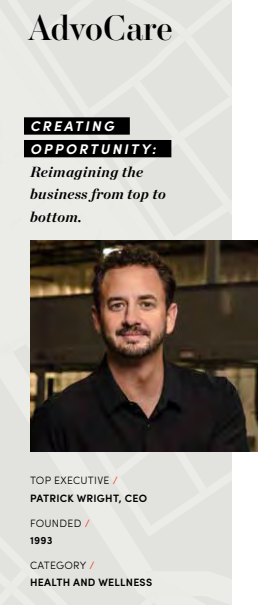
AdvoCare took monumental steps to maintain its core culture and commitment to quality.
By PATRICK WRIGHT
We’ll celebrate our 30th anniversary in February. That alone is not something many direct sellers or others can say. We’ve had so many amazing years and are planning for decades into the future. We had a chance to choose courage over fear—and we jumped at it.
I joined the company in 2008, during what was truly a golden age for AdvoCare. Our brand presence was everywhere: the NFL, NASCAR, Major League Soccer, TV advertising, College Football. We were quickly becoming a household name.
And then, in 2019, we announced—what appeared suddenly to the public—that we had entered into a settlement with the Federal Trade Commission (FTC), and we would be abandoning the multi-level aspect of our business.
To those outside a small group of the AdvoCare team, it seemed like the settlement occurred out of the blue, but that couldn’t be further from reality. We battled for over three years—privately, because we had to. We dedicated tens of millions of dollars in legal fees, millions on consultants and experts and comp plan analysis—doing whatever we could to satisfy the FTC’s demands. So, when we announced we were abandoning our multi-level model, people wondered why we didn’t fight.
But we did fight. We fought vehemently for many years. We chose to make the strategic decision to completely remove multi-level from our marketing plan because, in the end, it was the best for us. Single level was our only option—which meant putting the true popularity of our products and the loyalty of our customers to the test. We were able to see that AdvoCare could survive and thrive based solely on the merits of our products, our culture and our loyal distributors and customers who love the products.
I took a leap of faith with my amazing team and the decision was made on my third day as CEO to move forward with the single-level model. While this was not the third day on the job I’d ever envisioned, it was the best chance to save the company, move forward and continue to make an impact five, 10, 15 years down the road.
Many tough days followed that announcement. We got down to business with restructuring, layoffs and tightening in every single way—just to survive. We were in an unprecedented place. While affiliate models existed, there had never been a multi-level company with overrides and leadership bonuses that had transitioned to a single level compensation plan. There’s no map for companies, direct selling or otherwise, that have successfully achieved what we have. I am holding tight to the team I have because we’re unique in what we’re building, and I am forever grateful for how we’ve respectfully maintained our culture while making monumental change.
Making those announcements, sharing those changes—it was by far one of the most challenging times of my life. I knew we had to keep moving forward, and I felt a deep need to protect the business in any way that I could. Not protecting our loyal employees and distributors that still wanted to share our products was not an option I was willing to compromise on
New Focus. New Initiatives. New Opportunities.
I remember sitting in my office late one night, struggling with the enormity of the challenges we faced, when in a moment of clarity, I recalled what Marcus Aurelius once said, “What is in the way becomes the way.” It gave me a shift in mindset. Rather than worry about what we could no longer do, we began to shift our focus to the things we could do now that we couldn’t do before.

We started to ask ourselves: What if all that mattered was producing great products and making it easy to buy them? What if we didn’t have to launch a new product every six months at convention? What can we do differently? How can we change?
Our focus became simple: how do we become the best company for our 200,000 Preferred Customers? We took a deep dive into how to create excitement and consistency in ordering our products. We asked ourselves: What’s the company with the most user-friendly website out there? How does it work? How do we make ordering and trying our products easier?
We knew we needed to learn more. We set out to figure out who does “customer experience” the best, and how we could improve on it. We didn’t have the limitations of before, and neither did our distributors. How could we leverage that? We found that many of our distributors wanted to stay. They liked just selling products. They didn’t want to recruit. They wanted to sell and enjoy the products.
I thought about all the times I had stood on stage at convention and said, “This business is really for that mom that wants to make a couple hundred extra bucks a month.” I had said it, but had my actions really reflected that? Or had I been too focused on making our leaders happy?
If, as a company, we hadn’t focused on the mom making $100 before, we now had to not only focus on her—we had to make sure she could now make $200 for selling the exact same amount. That was our goal: Double the amount small distributors made and make the compensation plan 100 percent about them.
Keeping it Simple and Streamlined
Our first step was to simplify the checkout process on our website. In the past, there was a lengthy process for cold leads who came to the site to buy product. They had to click, register, become a customer—they couldn’t make a purchase without jumping through several hoops.
I know I wouldn’t do all that just to buy a product online. If I have to create an account, I’m out. If I need to do more than two clicks, I’m done. Shouldn’t we treat our customers with the same respect?
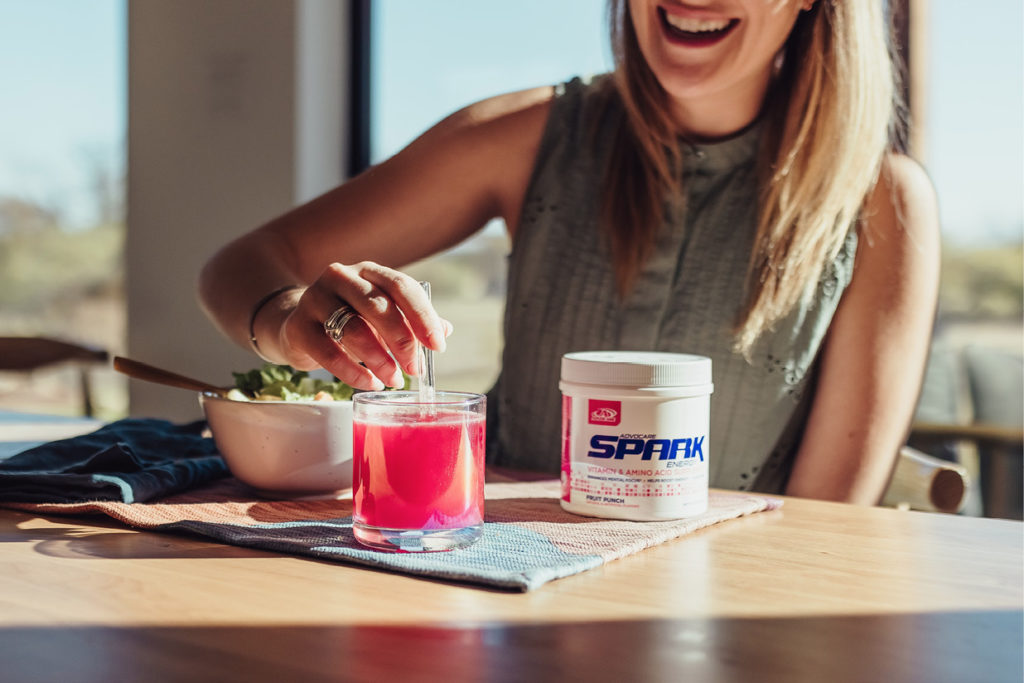
So, we changed our approach. Two clicks to check out. That’s it, and it works amazingly well. We added Apple Pay and guest checkout. We knew this approach would set off alarm bells for the field—and it did. But we asked them to trust us. We explained that if we sell more, you are going to make more—but you have to trust us.
Entering your ZIP code, finding a local distributor, offering personalized coaching—all those clicks that people had to go through—we got rid of it. We don’t ask customers for anything. What we discovered was—with that simple change—the conversion rate increased almost 10 times. And we passed the resulting commissions to the distributor on the back end.
We’ve built up a lot of trust and good will with our field with this maverick approach. We knew we had amazing products. We were going to build on that asset, hold on to our image and branding—and then we were going to try a bunch of things. Some would work. Some wouldn’t. But we would keep going.
We had a fail-fast mindset, and that made all the difference. Everything didn’t require a six-month development program. Launch it. See how it goes. If it doesn’t work, pivot. We began to take that mentality around everything that we did. We built a very simple compensation plan. I know how long it takes some companies to explain their comp plans. I used to be the same. I can now explain AdvoCare’s comp plan in about 15 seconds.
Our compensation plan is simple.
- Commissions on the sale of products (20-40%)
- Additional bonuses for total new customer orders and total customer orders
- Special monthly incentive rewards
- Annual incentive trip
We found that our distributors love these fun incentives, and they chase after opportunities. Whether it’s cash or AirPods or sunglasses they wouldn’t splurge on themselves, we tried it all to see what had the most traction. We poured everything into finding out what the field would and wouldn’t engage with.
At the same time—and this is very important—we began to recognize that in this new model, our field are hobbyists. They’re having fun, they’re sharing and they’re earning a little bit of extra money every month. So, we’re giving them opportunities to earn more than they used to, while honoring their level of commitment..
Key Lessons Learned
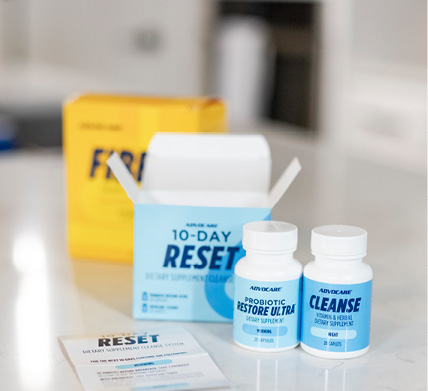
The reality is, with everything we’ve done; all the changes we’ve made; all the focus we’ve put in—there were two important lessons. And if you want to boil down the AdvoCare experience, the lessons are really simple and straightforward.
If you do what’s best for the customer, if your focus is 100 percent on that and you don’t get swayed by outside forces—things will work out. But the customer truly must be number one. And we have to challenge our pre-existing beliefs in order to keep that ideal in mind. Challenge your own thinking: Why is our website like this? Why do we market this product this way? What could we do or try differently? If the way something works isn’t the best thing for the customer—challenge it. You may not make every change, but you might make one that will make all the difference.
And the second lesson is a direct result of the first. Your leaders and your field will trust you more than you might expect. They will buy in more than you think. Will there be detractors? Always. But when you show them that doing the right thing for the customer and the right thing for the brand is ultimately the right thing for the field—they will respond favorably.
My hope is that you never have to face what we did. But the biggest takeaway from this for me has been that that you can never go wrong when you focus fully on the customer experience. If you have great products, and you work to truly make the customer experienced great—you, AND your field, will have success.
Staying in a Constant State of Growth
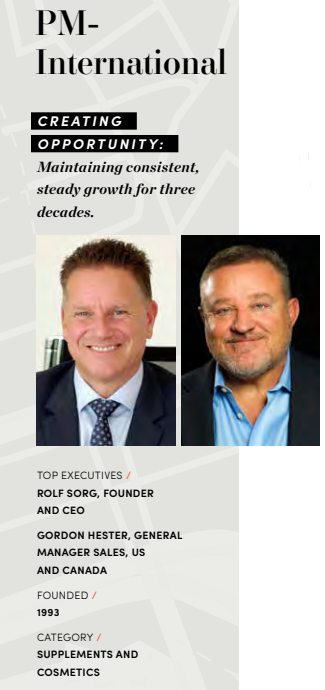
PM-International has set a high standard for prolonged, steady success.
By GORDON HESTER
The direct selling business in the US is going through a challenging transitional period. We are seeing an increasing number of companies struggle to evolve so they can remain competitive in a rapidly changing world. At the same time, we are dealing with high inflation, continued supply chain challenges, rising operational costs, reputation challenges and increased competition for consumers and new entrepreneurs.
Despite all these challenges, PM-International has achieved a constant state of growth for 29 straight years. PM has been awarded the DSN Bravo International Growth Award for two consecutive years and is on track to earn this award for an unprecedented third year.
I have been in this industry for almost 35 years and recently joined PM as their General Manager of Sales for the US and Canada. Like many, I was also curious how PM could maintain a constant state of growth since inception to the massive growth experienced over the last three years. A total of $2.38 billion in annual sales was reached in 2021. Below are my initial conclusions relating to the “PM Success Formula.”
Ultimate Decision Maker
In my many years working in direct selling and with many great leaders, the CEO and Founder of PM-International, Rolf Sorg, is the most talented leader I have ever worked with. Experience has taught me that the success or failure of any company will come down to how the leader runs it. Rolf has developed a time-tested cultural and business blueprint. The success formula has its foundations based on the following principles.
1 / High-Performance Culture
The company is managed with the mindset of giving your best every single day with a heavy focus on the key metrics that drive revenue. The company is data-driven and operates in a very “people-centric” way. There is very little tolerance for the three things that can stand in the way of success: entitlement, division and drama.
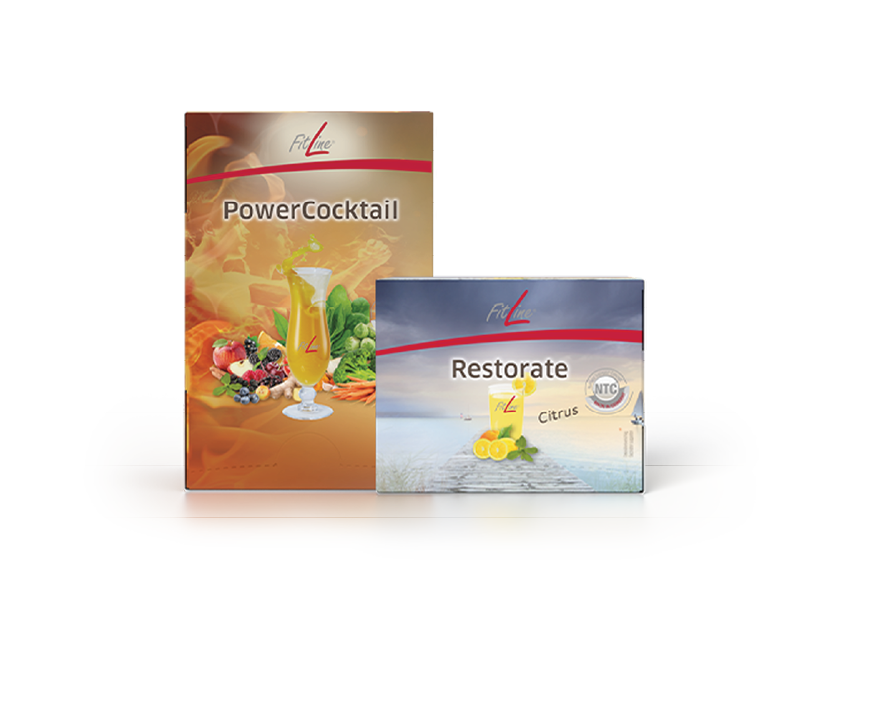
2 / Heart and Pride
One core value of PM-International is “heart and pride.” It refers to making your business a matter of the heart, sharing your genuine excitement with others and appealing to their pride. Rolf understood early on that the word “deserve” includes the word “serve” and established a culture based on a shared and deep commitment to living the PM mission.
3 / Conservative Financial Management
PM remains a debt-free company with a very high EBITDA. This allows us to invest back profits into ensuring the business stays competitive. In today’s marketplace, the costs of operations and innovation continue to increase. If a company does not have the resources to invest in growth, that can be a big obstacle to surviving challenging times. As a family-run company, swift decision making keeps PM-International one step ahead.
4 / World Class Products
To build a stable and long-lasting industry-leading company, you need to have products that create a loyal customer base. PM stands for “Premium” from beginning to end. Our products are exclusive and supported by 70+ international patents. It is why PM has sold over 800 million products since inception 29 years ago.
5 / Customer Focus
We have seen a shift in moving from an opportunity-centric approach to more of a customer-centric approach. Since the company’s inception, PM has been a step beyond the concept of customer-centric to the standard of being customer obsessed. In PM, the opportunity component of the business has created a passionate active distributor base focused on building a growing loyal customer base.
6 / Maintaining Field Trust
For any successful direct selling or network marketing company, the field is the primary driver of sales. The key is to keep them in a constant state of engagement. Any legacy company will tell you that is a difficult challenge as new distributors tend to leave quickly, and leaders tend to drift away from production over time. As the industry shifts to more of an omnichannel focus, it is essential to consider the impact on the field. As I look at the companies struggling to be successful today, the common challenge they have is that they have lost the trust of their field. This often tends to be a consequence of declining sales and commissions. The longer this occurs, the harder it is to right the ship. A big reason PM has experienced 29 straight years of growth is that they have never lost field trust or momentum.
A DNA of Innovation
Companies must remain willing and able to make changes to ensure they stay competitive in the marketplace. I often refer to this as having a “DNA of Innovation.” The principles that drive that at PM are:
- Taking risks
- Staying out of the comfort zone
- Learning from failures
- Scaling quickly through systemization
- Managing change effectively
While other companies have different visions and strategies than PM, there are some lessons on keeping consistent growth that can have value for any company. Many of our success principles are timeless and have been practiced since PM started 29 years ago. Change is the only constant in life, so adjusting to an ever-changing marketplace is the key for any company to ensure they remain relevant and competitive.
Building a Better Model
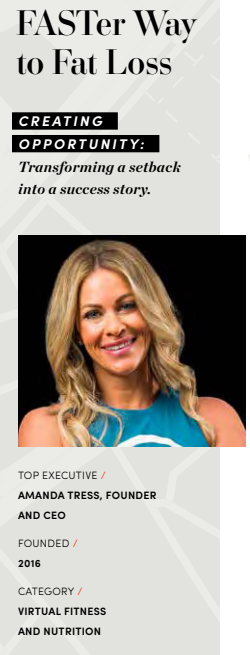
FASTer Way to Fat Loss lifts micro-influencers to new heights of success.
By AMANDA TRESS
When you start out in this channel, it’s impossible to predict what those first years will bring. You anticipate that there will be challenges. Unanticipated problems. Unexpected roadblocks. And, of course, you hope that there will be some successes in there, too. But, in the beginning, you just don’t know what you don’t know.
I founded FASTer Way to Fat Loss in January of 2016 with 11 clients, and I am blown away that since that time we have empowered over 252,000 people to transform their lives. Along the way, we have received many accolades—including making the Inc. 500 list four years running.
But it hasn’t always been that way. In May of 2018, I received devastating news. That spring had been a really exciting time. Our certification program was accredited with the biggest organizations in the wellness industry, and we were forming an amazing group of Certified Coaches to help us expand.
But that all changed when our top Certified Coach—someone who had earned over $500,000 in her first year with us; someone I had spent days, weeks and months of time mentoring—decided to start her own business leveraging the strategies, training and tools we had provided.
I felt so many emotions in that moment: sadness, betrayal, confusion. It’s tough when someone you have poured so much time, energy and resources into chooses to leave when you’ve worked so hard to help them to succeed.
Time to Pivot

It was this season, this situation, this pain that prompted me to consider whether or not there could be an additional strategy that would allow me to expand the business beyond just relying on our Certified Coach community, which led me to develop a one-tier micro-influencer marketing model.
Our client journey is very simple. We incorporate intermittent fasting, carb cycling, tracking micros, whole food nutrition and 30-minute workouts. In our new client six-week program, you pay $200 and learn all these strategies to kickstart your wellness journey then transfer to the VIP program where you gain access to even more resources and the opportunity to become a micro-influencer.
You can choose one of two tracks: become a Brand Ambassador for free or a Certified Coach for $5,000. We absolutely love our Certified Coaches and have an incredible community of wellness professionals. We also really appreciate our Ambassadors. When an Ambassador spreads the word about the FASTer Way to Fat Loss, they receive a one-time $50 commission on our six-week program. They often represent multiple brands in addition to ours and use our strategies and marketing to quickly and exponentially increase their followers.
Micro-influencers represent the present and the future. Social media platforms favor them in newsfeeds. You might have noticed this recently—perhaps you follow some big brands on Instagram or Facebook, but you aren’t seeing them in your newsfeed as much as you used to.
What you are seeing more of are smaller content creators. In the past three months alone, we’ve had many Ambassadors or Coaches grow from hundreds of followers to 150,000 followers. We empower our micro-influencers—whether Ambassadors or Coaches—to generate highly qualified leads, and then we do quite a bit of hard work to help convert those leads into paying customers. We give them social media content. We share marketing tips. We have lead generation campaigns that our micro-influencers love to promote.
Recently, we did a Gut and Butt Five Day Challenge. We told our micro-influencers to promote the challenge, which cost $20 in order to receive a 50 percent commission. In these micro-commitment campaigns, we’ve had up to a 27 percent conversion rate. You are simply not going to experience those percentages with paid advertising.

One and Done
The reason I call this a one-tier model is because not only do we have Ambassadors who work directly with the corporate team to send clients to the six-week program, we also empower our Coaches to bring on their own Brand Ambassadors within their organization.
The Brand Ambassador receives a one-time commission. And frankly—that’s all they care about. They do not worry about recurring or passive revenue. They simply want to share something they love for that one-time commission.
I know it can be intimidating to consider a new model. I reside in Tampa Bay, and we recently had a hurricane come through. I was preparing to evacuate with five kids—it was stressful to say the least. But I had the privilege of preparation. We’ve all seen the reality of where the channel is headed. What used to work no longer resonates. But each of us currently has the privilege of preparation. I encourage you to turn your pain points into purpose as you consider new strategies.
The Perks of Being a Newcomer

Having an outsider’s view fuels Qyral’s success.
By HANIEH SIGARI
When I founded Qyral, I had certain ambitions in mind. I’d already built businesses in healthcare and eCommerce, and I knew exactly what I wanted to achieve. I wanted to create something cutting-edge; make a difference; give back to others; and provide a path to success for as many people as possible.
The more I looked into the history of direct sales, the more convinced I became that this channel was prime for disruption and was the obvious solution to empower, educate and elevate others. But I couldn’t ignore the downsides. Coming from the cutthroat world of eCommerce, where everybody is in a race to out-innovate, the technologies and methodologies of direct sales felt old and antiquated. I wanted to try something new, but every idea I suggested was shot down by industry experts.
We already tried. It doesn’t work. You can’t do that.
Breaking the Mold
As a biochemist and entrepreneur, I’m both analytical and creative when it comes to running my business—I don’t like to be told that I can’t do something. Qyral is already the culmination of so many firsts. The first personalized skincare in the social selling space. The first to adjust pH and concentration. The first to partner with telehealth medicine to offer prescription-grade, custom-compounded formulations direct to consumers. But what good was all that innovation if it was trapped in tired, underperforming methodologies?
Direct selling has been around since the 1930s because it works. I believe that. But when I explored standard training tools for distributors, I felt like so much was missing. New technologies are released all the time. Old ones are constantly evolving. The way we harness these technologies has to evolve, too.
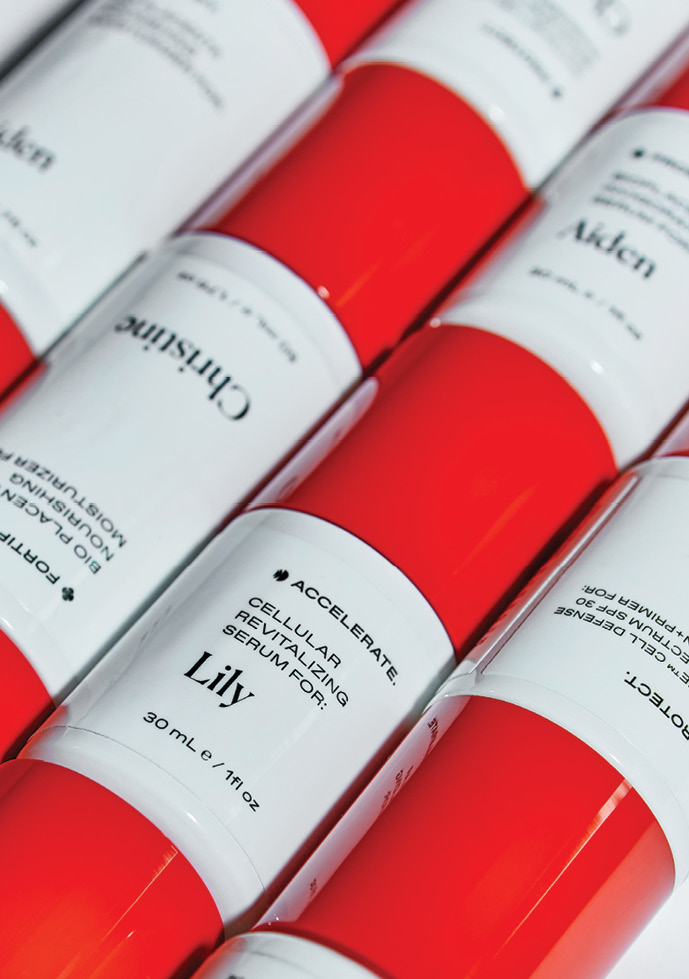
When you’re enmeshed in an industry, it’s sometimes hard to take that step back. So many direct selling companies are founded and led by amazing people who’ve been involved in the business most of their careers. That experience and insight cannot be underestimated, but I believe it also creates blind spots. If you’ve risen through the ranks as a distributor before starting your own business, why wouldn’t you duplicate the sales methods that worked for you?
What I’ve seen is that traditional methods become less effective over time. Layer in regulation, and it starts getting more convoluted. Knowing when and how to innovate is a challenge for every company, but it’s especially difficult when leadership is used to doing things a particular way.
In sales, there will always be rock stars—outliers with natural talent and charisma who can sell water to a fish. I made a conscious decision not to focus on those unicorns. I wanted to help as many people as possible, and that meant creating a system that could be used by anyone.
I found inspiration from franchises. You don’t need to be a rock star to run a successful McDonald’s or Dunkin’ Donuts—those companies have developed sequential, duplicable systems anyone can follow. That’s what I wanted to create. I’d much rather find a hundred coachable people with drive and commitment than sign up a million distributors who barely scrape a profit.
Insight over Hindsight
One of the best ways to tap into innovative ideas is to look at newcomers to the industry. Mega corporations struggle to pivot and produce something new. eCommerce killed department stores. Netflix put Blockbuster out of business. Expedia did away with the travel agent. Disruption happens constantly. You either stay agile enough to innovate or get slow enough to be made obsolete.
In Qyral’s early days, I wanted to develop a strategy for selling on third-party marketplaces like Amazon. I was immediately told I couldn’t—selling directly to consumers would alienate distributors and damage the brand. I listened to that advice—and I regret it.
Direct selling brands have to have stores on these marketplaces. Otherwise distributors do it themselves, undercutting retail prices and damaging the integrity of the company and opportunity.
As a consumer, why would I buy through a distributor when I can order on Amazon? As a distributor, why would I concentrate on building a local network when I can list my products on the world’s biggest marketplace?
When established businesses fail to innovate, newcomers don’t hesitate. Distributors saw the potential and immediately filled that gap, leaving companies scrambling to keep up. With hindsight, it was obvious. But industry wisdom was still hung up on old, obsolete business models.
The startup phase is exciting—you’re full of ideas and eager to reinvent how the business works. Most of us lose touch with that as we become embedded in the systems we once wanted to revolutionize.
Direct selling’s superpower is its ability to tap into a steady stream of newcomer insight and innovation. Listen to your distributors—watch what they’re doing on the front lines. You’ll uncover incredible ideas that could empower your field and enrich your company culture. DSN
Disruption happens constantly. You either stay agile enough to innovate or get slow enough to be made obsolete.
From the January/February 2023 issue of Direct Selling News magazine.


